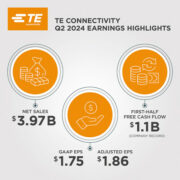Newly published document provides operators with technical guidance to increase the capacity, quality and efficiency of modern rail systems.
With digitalization, many new technologies will enter the railway system that place high safety requirements on IT environments. As part of the sector initiative, Real-Time Innovations (RTI), the largest software framework company for autonomous systems, has collaborated with a group of European rail operators and industry companies to move this initiative forward.
“RTI has written the reference implementation annex for the SCP Messaging APIbased on the Object Management Group® (OMG®) Data Distribution Service (DDS™) specification to bring this powerful data-centric approach to rail system communications,” said Mark Hary, Market Development Director, Commercial Markets, RTI. “RTI Connext® is pioneering safety-certified, data-centric communications based on the DDS standard across the transportation sector – automotive, aviation, marine and rail – and this work immediately benefits next-generation railway implementations. The overall document is a collaborative effort to create a body of work that will guide the rail industry forward with safety at the forefront, and we are pleased to be part of a diverse group that produces this guidance.”
With the introduction of enhanced Control Command and Signaling (CCS) approaches, and novel technologies such as advanced sensing and artificial intelligence into the rail system, it is necessary to design the appropriate IT platforms for future rail operation. In this context, the railway initiatives Reference CCS Architecture(RCA) and Open CCS Onboard Reference Architecture(OCORA) started working on a Safe Computing Platform conceptin 2020, which is expected to provide the basis for safety-relevant railway applications for both onboard and trackside deployments. A key design paradigm is the introduction of a standardized method for separating applications from the computing platform. This decouples domains with very distinct lifecycles and leverages latest advances in the IT sector, while still leaving room for vendor differentiation on the detailed computing platform implementation.
To take this work to the next stage, the railways and industry players including RTI, DB Netz AG, duagon AG, Nederlandse Spoorwegen, SBB, Siemens Mobility GmbH, SNCF Voyageurs, SNCF Réseau, SYSGO GmbH, Thales and Wind River have jointly developed a first version of the specification of the possible API between railway applications and the Safe Computing Platform, and published this in OCORA Release 2.
The published work includes a general definition of the concepts, key design paradigms for safe communication and computation, and implementation guidelines. Further, an analysis was conducted as to how functions defined in the POSIX standard could be reused for the desired API. Several open points were identified during this process that will require further specification work in the context of Europe’s Rail program. Overall, the published work provides a solid basis for further specification and prototyping of possible Safe Computing Platform implementations.










